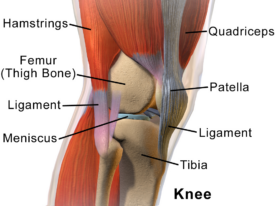Total knee replacement surgery, sometimes known as knee arthroplasty, is a common procedure to reduce pain and improve movement. Your doctor might order this procedure if you have osteoarthritis, rheumatoid arthritis or other joint condition.
If you need total knee replacement surgery, you’ll generally have a couple months to prepare. The road to recovery starts even before the first incision is made. There are steps you can take to make the best use of your waiting time and to help increase your chances for a successful procedure and recovery.
Before your total knee replacement surgery
It’s helpful to have a plan in place for your upcoming surgery. Being organized will help you feel less overwhelmed during the days before and after your surgery. First, make a list of your medical information. You’ll refer to this information often during the process, and having it all in one place can reduce your stress. Your list should include:
- Your insurance information
- Your current doctors
- All medical conditions you have
- All medications you’re currently taking
- Previous surgeries you’ve had
- Allergies or dietary restrictions you have
Additionally, you should have with you copies of pertinent legal documents, such as an advanced directive. Also make sure that your medical team has the name and contact information for family members or caregivers who will be helping you during your hospital stay.

Prepare for your recovery
It takes most people 3-6 weeks to get back to normal, daily activities. Anything you can do in advance to make those weeks easier will be a huge help to you when you get home from the hospital.
The first thing to determine is where to recover. Your condition before surgery is one thing you should consider. Perhaps you were walking with an assistive device or have a history of falls. Ask your healthcare team to make suggestions on post-surgery care based on your prior level of function. After consulting with your care team, you may determine that a short-term rehab facility is the best option for you immediately after being released from the hospital.
However, if you believe that you will return home directly after surgery, plan accordingly.
- Make sure you have a ride home from the hospital and someone to stay with you.
- Arrange in advance for family members and caregivers to check in on you.
- Have frozen meals on hand or set up meal delivery.
- Apply for a disabled/handicap parking permit.
- Modify your living space to make important items easier to reach.
- Move any rugs or furniture that could put you at risk for a fall.
The safe-home checklist from the National Center for Injury Prevention and Control is a great starting place to help prepare your home.
General health recommendations to prepare for your total knee replacement
Your doctor will probably have some suggestions for optimal conditions going into surgery. It’s generally considered good practice to:
- Quit or, at least, cut down smoking. Smoking affects your circulation, and being a smoker can extend your healing time.
- If indicated, lose weight to reduce the stress on the new joint you’re about to get.
- Follow a healthy diet even if weight loss is not the goal. The healthier you can eat before surgery, the better.
- Stop taking any controlled substances, and tell your doctor if you have been using controlled substances, which can interfere with medications you’ll need during surgery and could raise your overall risk.
Exercises to do before surgery
A 2014 study suggests that one or two physical therapy sessions before surgery may lead to a 29% reduction in the amount of post-operative care patients need. Anecdotal evidence supports this.
“In my experience, patients who follow a tailored, pain-free strengthening and flexibility routine stand to benefit post-operatively,” says Dr. Patrick Donovan, owner of Heather Lane Physical Therapy.
Donovan explains that a physical therapy routine helps strengthen the knee and hip muscles and improves your flexibility. Plus, if you begin a routine before surgery, you’ll learn valuable skills that will help you after your operation, including how to use a cane, walker or crutches. Your physical therapist also can show you exercises you’ll need to do as part of your post-operative therapy, giving you a head start. Squats and hamstring stretches are just two types of exercise your PT is likely to suggest.
If you’re preparing for an upcoming total knee replacement, we can help. Contact Heather Lane Physical Therapy today for a free evaluation to get started.

